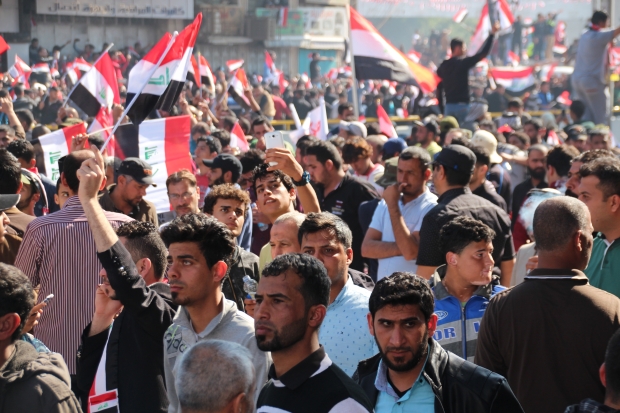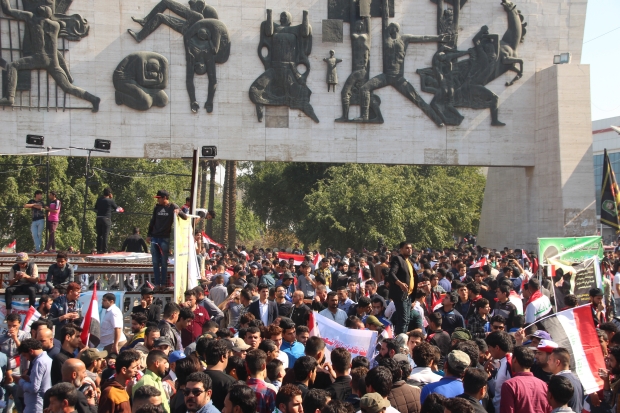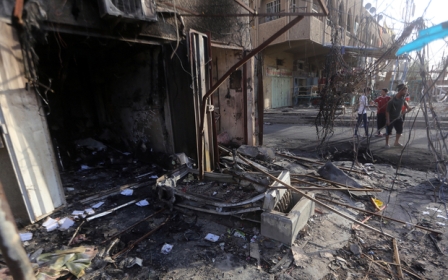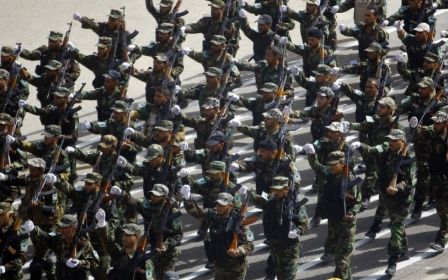Iraqi cleric Sadr threatens to march on Baghdad's Green Zone
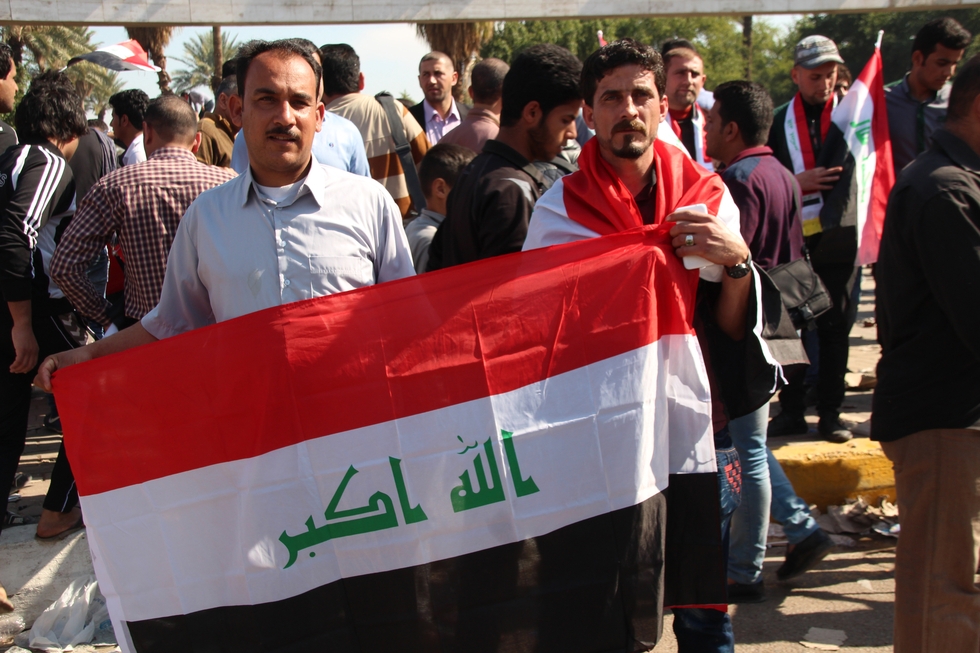
BAGHDAD - Muqtada al-Sadr, the powerful Shia Muslim cleric, on Friday threatened to raid Baghdad’s Green Zone with an army of protesters if the government did not carry out "rooted" reforms to combat corruption.
Tens of thousands of his supporters turned out early on Friday to protest in Tahrir Square, in central Baghdad, just a few hundred metres from the internationally fortified Green Zone, which houses parliament, many government buildings and most foreign embassies.
Sadr, who has a huge mainly working-class following and is very popular with millions of young Iraqis and also commands a powerful militia, additionally demanded that authorities fix the current economic crisis fuelled by the sharp decline in global oil prices and the ongoing war against the Islamic State (IS) group.
While many of Baghdad’s politicians live in the heavily fortified Green Zone and at the very least pay lip service to Washington, Sadr has built his reputation on opposing the US and being a man of the people. He rarely visits Baghdad but has an almost unrivalled ability to rally people to his cause in the capital.
"Today, we are at the doors of the Green [Zone], and tomorrow the people will be inside to restore their rights from the corrupted oppressors," Sadr told his supporters in a speech.
"Whoever [is linked to the] government and does not listen to your voice, has to step down. The government has left its people to struggle with death, fear, hunger joblessness and occupation," he added.
As he spoke, crowds enthusiastically waved the Iraqi flags as Sadr earlier suggested. Some supporters even wrapped themselves in flags, while others raised small banners saying "Yes, Yes for the reforms" and "Reform is a ship - he who rides it will survive and he who does not will perish".
Chants of "Yes, yes for Muqtada" and "Yes, yes for Iraq" as well as "Yes, yes for reform" rang out loudly and repeatedly.
Police were out in force, and all the roads leading into the square were blocked to cars, but this didn’t seem to stop people from flooding in and no security violations were reported, security sources told Middle East Eye.
Iraqi security forces have been on high alert since Thursday evening, when two suicide bombers hit a Shia mosque in eastern Baghdad popular with Sadr supporters, killing at least 15 people and injuring many others.
Sadr, who appeared wearing a black turban and cloak and was surrounded by armed guards, said that the current security, political and economic crises were all caused by policies adopted by former Iraqi prime minister Nuri al-Maliki.
Maliki was forced to step down in September 2014 after IS seized vast swaths of Iraqi territory and was replaced by Haider al-Abadi, who has pledged to root out corruption and restore security.
Last week, Abadi asked parliament to free his hand to allow him to make sweeping cabinet changes and bring in technocrats who would be better equipped to tackle rampant financial and administrative corruption, but parliament denied his request.
Despite Abadi’s efforts, Sadr said that more had to be done and that he must accept his share of the blame for Iraq’s problems.
"None have escaped these crises besides those who [live] behind the [blast] walls and manipulate the people," Sadr said.
Abadi’s reforms have to be deeply "rooted” and “not tinkering,” he added.
"Today, the prime minister ... is obligated to conduct the reform."
Multi-million man march
The protest could just be the beginning of much bigger things to come. On Tuesday, the cleric called for a “multi-million” man protest in central Baghdad to demand real reforms, including a radical restructuring of the current political system brought in at the start of the US-led occupation in 2003.
The political power-sharing agreement provides an umbrella for corrupt ministers and top officials and makes it difficult to tackle corruption and cronyism.
Sadr and his political bloc are a part of the system. Sadr’s party has more than 40 seats in parliament out of 325 and holds three ministries and dozens of top posts in Abadi's government. Much like other key players in Iraq, those linked with the government have also come under fire from critics for alleged corruption. But the cleric, often dubbed a “firebrand” in the Western press, says he wants to help break free of this cycle and help Abadi to bring in reforms.
On Friday, he moved to distance himself from Sadrist officials and lawmakers by saying that he was not backing or protecting any corrupted Sadrist officials.
"Today I am declaring that none of the people who are in the government are representing us, despite whether he is a sympathizer of us or belongs to us," Sadr said.
However, critics point out that these words ring hollow and that Sadr could easily fire the controversial officials, something he has not been willing to do.
Losing battle
Sadr’s demonstration was only the latest to hit Baghdad, which - along with Shia-dominated southern Iraqi districts - has seen anti-corruption protests every Friday since last summer.
In response, Abadi has reduced the size of his cabinet, removed several deputies and cut ministry budgets to reduce waste and boost performance, but that has not been enough to subdue decades of abuse.
Under the dual strain of falling oil prices and fighting IS, Iraqi ministries have grappled to fill their coffers. As a result, they have had to re-introduce certain taxes, impose social security contributions and cut the benefits of top officials and MPs in order to keep paying the monthly salaries of four million governmental employees and tens of thousands paramilitary troops that back the Iraqi security forces in their war against IS.
"People are tired. They [the Islamic Shia parties] have been stealing the wealth of the country in the name of religion. They are oppressors and have destroyed the people," Sheikh Qassim al-Saeidi, one of Sadr's followers in Tahrir Square, told MEE.
"Sadr, the leader, was clear when he said we are at the door of the Green Zone, and next Friday we will raid the Green [Zone] if he says so," Saeidi said.
Yet for all the heated discourse, analysts believe that Sadr is aware of his own limitations and the host of challenges involved in tackling corruption.
"Sadr controls no more than 10 percent of the parliament's votes, and this is not enough to provide a solid ground for Abadi to launch his reforms, and does not concern the other partners [enough to push them] to present any concessions," Abdulawahid Tuama, an independent Iraqi political analyst, told MEE.
"What Sadr did today is just throwing a stone into a static pool," he said.
Instead, the protest and pledges to raid the Green Zone should be seen as a calculated show of strength to help increase the small faction’s bargaining power.
"Raiding the Green Zone is not an easy task as Sadr tries to say,” Tuama said. “It would be a political coup, and all parties, armed factions, the Iraqi security forces and the US-led military coalition forces would repel it."
New MEE newsletter: Jerusalem Dispatch
Sign up to get the latest insights and analysis on Israel-Palestine, alongside Turkey Unpacked and other MEE newsletters
Middle East Eye delivers independent and unrivalled coverage and analysis of the Middle East, North Africa and beyond. To learn more about republishing this content and the associated fees, please fill out this form. More about MEE can be found here.


